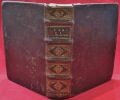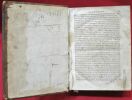3 books for « machiavelli niccolo ... »Edit
-
Topics
Humanism (1)
Italian (1)
Italy (1)
Philosophy (2)
Policy (1)
War (1)
-
Countries
Denmark (1)
France (2)
-
Syndicate
ILAB (2)
SLAM (1)
Le premier livre des Discours de l'estat de Paix et de Guerre, de messire Nicolas Macchiavegli, Secretaire & citoyen Florentin, sur la première décade de Tite Live, traduict d'italien en françoys.
1544 In-folio (309 x 200 mm), vélin souple de lépoque, dos lisse, (5), (1) blanc, LVI [ie. LXV] feuillets, (5) pages de table, (1) feuillet avec la marque dimprimeur de Denis Janot [sign. a6, A-K6, L-M4]. Avec Privilège du Roy. 1544. De l'imprimerie de Denys Janot imprimeur du Roy en langue Francoyse, & libraire juré de l'Université de Paris.
Édition originale de la traduction française, et premier ouvrage de Machiavel traduit en langue étrangère : "The first translation of a work of Machiavelli" (Willis H. Bowen, "Sixteenth Century French Translations of Machiavelli to be published" in 'Italica', vol. 27, n° 4, décembre 1950, p. 314).Le traducteur, Jacques Gohory (1520-1576), joua un rôle fondamental dans la "préhistoire" de la réception de Machiavel. Traducteur, poète, mathématicien, alchimiste, botaniste, médecin, paracelsiste et historien, il est reconnu comme le meilleur interprète de Machiavel de son temps, son oeuvre surpassant en compréhension et en exactitude les traductions de la seconde moitié du XVIe siècle.Conçu en 1543 (le privilège est daté du 12 avril 1543), louvrage a été imprimé par Denis Janot et publié lannée suivante, en 1544, accompagné dune épître dédicatoire du jeune traducteur, alors âgé de 24 ans, adressée à Gabriel Le Veneur, évêque dEvreux.Le portrait de Machiavel gravé sur bois, reproduit à deux reprises (verso aiiii et f. LXI), sera repris dans de nombreuses éditions postérieures. Louvrage est également orné de nombreuses lettrines gravées sur bois à motifs floraux et héraldiques (grand semé de fleurs de lys). La page de titre présente la grande marque typographique de Jacques Gohory, encadrée de ses cinq devises (cf. Picot, Recueil général des sotties, II, 1912, p. 179).Sur limportance fondamentale de cette édition dans la diffusion de loeuvre de Machiavel en Europe, cf. Rosanna Gorris Camos, "Dans le labyrinthe de Gohory, lecteur et traducteur de Machiavel", 'Laboratoire italien', 8 | 2008, 195-229.Publié à Florence en 1531, après la mort de Machiavel, le 'Discours sur la première décade de Tite-Live' sest imposé comme lun des fondements de la pensée politique moderne. Prolongeant lanalyse du 'Prince', il déplace la réflexion du pouvoir dun seul vers les institutions collectives. Machiavel y développe une conception républicaine originale : la liberté naît du conflit entre le peuple et les grands, et se nourrit des vertus civiques mises en valeur par les républiques antiques. Contre lidéal médiéval de concorde, il montre que la lutte sociale nest pas une menace mais une source de vitalité politique. De cette rupture naît une nouvelle manière de penser la loi, lengagement citoyen et la république, qui marquera durablement la tradition européenne. (J. Balsamo, 'Les traductions de litalien en français au XVIe siècle', 2009, p. 284. Bertelli & Innocenti, 'Bibliografia machiavelliana', XVIe s., n° 65, p. 24-25. Gerber, III, p. 21, n° 1. Rawles, 'Denis Janot, Parisian Printer & Bookseller' (thèse), 1976, III, n° 214. Renouard, 'Les marques typographiques parisiennes', n° 480).Seuls quatre exemplaires de cet ouvrage sont recensés dans le monde (WorldCat).Remarquable exemplaire, enrichi de notes manuscrites en italien, allemand et français, portées au recto de la première garde blanche des XVIe et XVIIe siècles: suppliques et remarques relatives à LÉducation du prince chrétien dErasme. Ce témoignage multilingue atteste du rayonnement et de limportance de cette édition française quant à la diffusion internationale de louvrage.Habiles restaurations de papier en marge blanche des feuillets XV et XVI, sans atteinte au texte. Quelques auréoles claires. Petites traces de restauration à la reliure.Très bon exemplaire, dans sa première reliure de vélin souple, très grand de marges, bien conservé.


Phone number : 33 01 47 07 40 60
Histoire florentine de Nicolas Machiavel citoien et Secretaire de Florence. Nouvellement traduicte d'Italien en Francois, Par le Seigneur de Brinon Gentil-homme ordinaire de la chambre du Roy. - [FIRST FRENCH TRANSLATION OF MACHIAVELLI'S 'FLORENTINE HISTORIES']
Paris, Guillaume de la Noue, 1577. 8vo. In recent full limp vellum with yapp edges. Woodcut printer's device on title, woodcut headpieces and initials. Small closed tear to upper inner margin of title-page. First 33 ff. with small worm tract in inner margin, with minor loss of text. Light dampstaining to first and last leaves. A good copy. (36), 294, (6) pp.
The exceedingly rare first French, and presumably very first overall, translation, of Machiavelli's Florentine Histories" his famous account of the political events and power struggles in Florence during the Renaissance. Essentially being a panegyric to the house of Medici, Machiavelli's work offers valuable insights into the rise and fall of political factions, the challenges faced by republican governments, and the dynamics of power in a city-state. Although often overshadowed by his more famous 'The Prince', the present work is important in understanding Machiavelli's broader political philosophy and is an indispensable document in understanding renaissance politics in general. The Histories constitute an essential work for understanding the political development of the late Machiavelli, and is “also an important item in modern historiography because for the first time the issue of conflict, and more precisely of urban conflict, finds itself at the heart of historical narrative (…).Infact, the Histories constitute the first attempt in modern historiography to analyze the totality of individual and collective agents and factors that allow a community to sustain itself or to founder. This analytical quality was certainly at the basis of the interest in the work outside Florence and the fact of its being translated. As Yves de Brinon explains in dedicating his ‘Histoire Florentine [the present work] to Cathrine de Medici, the case of Florence is a model for the dangers that threaten the integrity of every state and the Kingdom of France in Particular.” (Landi, A re-reading of Machiavelli). Machiavelli visited France, representing the Republic of Florence, where he - and later his writings - exercised great influence. The Huguenot, Innocent Gentillet, whose work commonly referred to as 'Discourse against Machiavelli' or 'Anti Machiavel', accused Machiavelli of being an atheist and accused politicians of his time by saying that his works were the ""Koran of the courtiers"", that ""he is of no reputation in the court of France which hath not Machiavel's writings at the fingers ends"" (Birely, The Counter Reformation, 1990). “Although Machiavelli became the embodiment of a real ""devil theory of history,"" there was nothing supernatural or even suspicious about his journey across the Alps. As the French translator remarked to his customers in 1544, ""This Florentine merchant has voluntarily left his own country to be received into yours.... Do not be so ungracious as to refuse him citizenship. From all appearances he was welcomed with open arms, or at least open minds. Within a few years, one of his admirers declared that he was a prophet honored more in France than in his own country."" (Kelley, Murd'rous Machiavel in France: A Post Mortem). Following the crisis of 1513, which involved arrests for conspiracy and torture, Machiavelli's relationship with the Medici family gradually improved. Despite the dedication of his book ""Il Principe"" to Lorenzo II de' Medici having little effect, Machiavelli found favor with a faction in Florence that was not opposed to him and was granted an appointment. In a letter Machiavelli expressed his dissatisfaction with his idle state and offered his valuable political experience to the new ruler. To further solidify his position, Machiavelli, adopting a somewhat courtier-like attitude, arranged for the staging of his play ""Mandragola"" at the wedding of Lorenzino de' Medici in 1518. In 1520, he received an invitation to Lucca for a semi-private mission, indicating that his ostracism was coming to an end. Later that year, Giulio Cardinal de Medici commissioned him to write a history of Florence. Although this was not exactly the role he desired, Machiavelli accepted it as the only way to regain the favor of the Medicis. The purpose of the work, although unofficial, was to restore the city's official historical standing. The salary for this appointment was not substantial, starting at 57 florins per year and later increased to 100. In May 1526, Machiavelli formally presented the finished work to Giulio de' Medici, who had become Pope Clement VII. The Pope appreciated the work and rewarded Machiavelli, though only moderately, and sought his support in creating a national army based on his theoretical work ""The Art of War,"" in preparation for the War of the League of Cognac. However, Machiavelli's hopes were shattered following the Sack of Rome in 1527 and the fall of the Medici government in Florence. Soon after, Machiavelli passed away. This exceedingly scarce first French edition was issued with two variant title-pages, the present referred to as variant-b. (see Gerber, Niccolo Machiavelli). Bibliopgraphia Machiavelliana, p. 60, no. 160. Gerber, dritter teil, p. 37, D-b. Brunet 1279.
Tutte le opere DI NICOLO MACHIAVELLI Cittadino et Secretario fiorentino, divise in V. parti, et di nuovo con somma accuratezza ristampati. Al Santissimo et Beatissimo Padre signore nostro Clemente VII.
Sans lieu , une des Editions dites " Alla Testina", imprimée à Genève, la pagination de notre exemplaire le désigne comme étant la troisième, quatrième ou cinquième Edition 'alla testina' entre 1628-1670, avec 5 textes reliés en un volume in-8 de 230x170x55 mm environ : I. Libro primo Delle Historiae di Nicolo Machiavelli Cittadino et Secretation Fiorentino (p.11 à 320), il manque les 10 première pages y compris le titre et 1 feuillet (p. 201-202), - 2. Discorsi di Nicolo Machiavlli Cittadino et Secretario Fiorentino sopra la pime Deca di T. Livio à Zonobi Buondelmonti et a Cosimo Rucellai, 8ff. (titre avec portrait, epître), 280 pages, - 3. I Sette Libre dell'arte della guerra, 152 pages, avec 9 planches dont une double, - 4. Il Principe. La Vita di Castruccio Castracani da Lucca. Il Modo che tene il Duca Valentino. I Ritratti delle cose della Francia et della Alamagna, 2ff. (titre avec vignette -portrait), 102 pages, 1f.blanc, il manque 1 feuillet (p. 103-104) - 5. L'Asino d'oro. manque la page de titre suivi de : Capitolo dell' occasione. Capitolo di fortuna. Capitolo della ingratitvdine. Capitolo dell' ambitione. Decennale, cioè compendio delle coste fatte in X. anni in Italia. Novella piacevolissima. Mandragola, Comedia. Clitia Comedia (manquent les p. 135 à 140 et p. 151 à 158), p. 3 à 150, texte en italien, plein veau brun, dos à nerfs portant titres dorés, orné de caissons à riches motifs dorés. Des rousseurs, cernes et pages brunies, des notes anciennes manuscrites à l'encre et au crayon à papier, des ratures par endroits.
Nicolas Machiavel (en italien : Niccolò di Bernardo dei Machiavelli) est un humaniste florentin de la Renaissance, né le 3 mai 1469 à Florence, et mort dans cette même ville le 21 juin 1527. Théoricien de la politique, de l'histoire et de la guerre, mais aussi poète et dramaturge, il a été pendant quatorze ans fonctionnaire de la République florentine pour laquelle il a effectué plusieurs missions diplomatiques, notamment auprès de la papauté et de la cour de France. Merci de nous contacter à l'avance si vous souhaitez consulter une référence au sein de notre librairie.
 Write to the booksellers
Write to the booksellers






